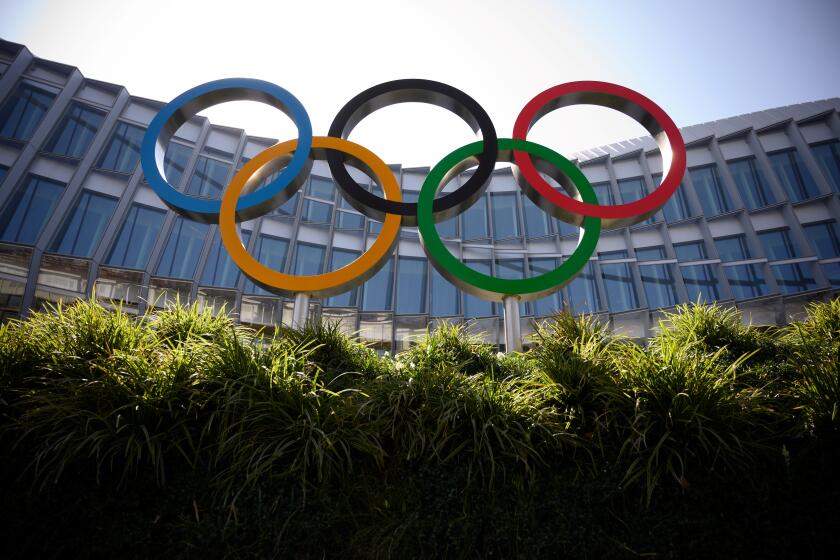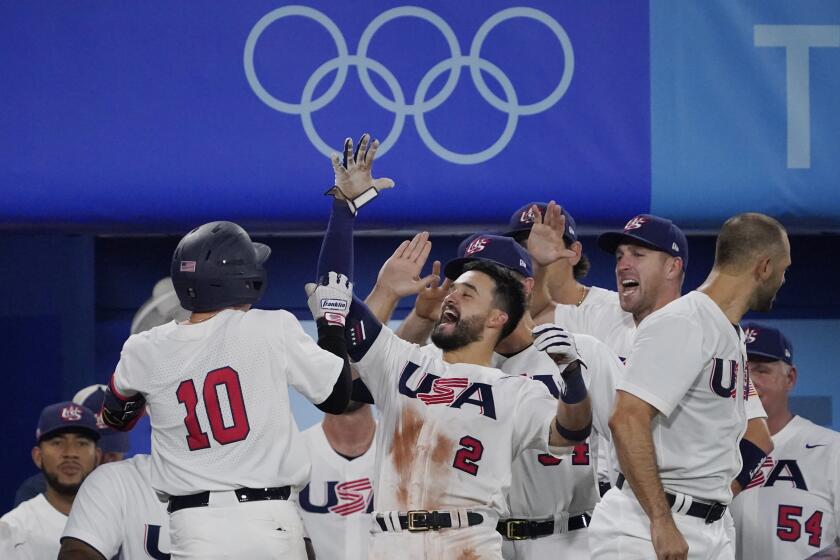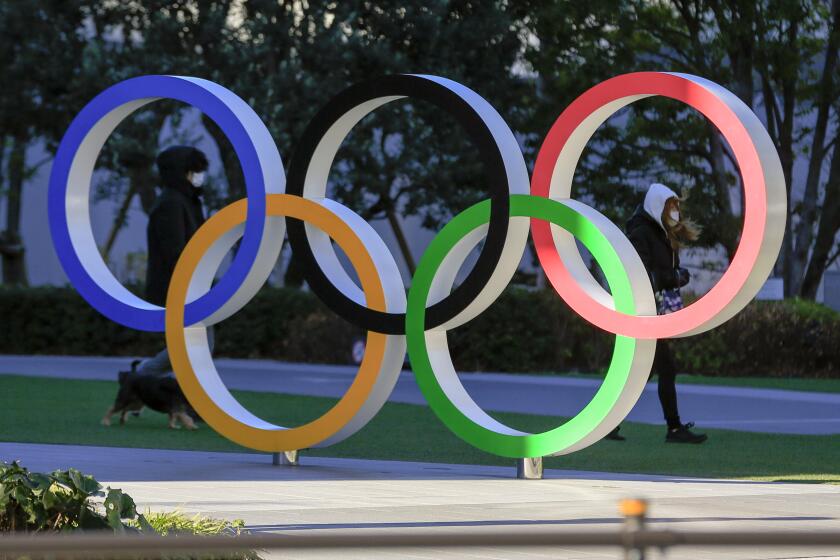2028 L.A. Olympics: Agreement outlines key issues but final price tag remains unclear
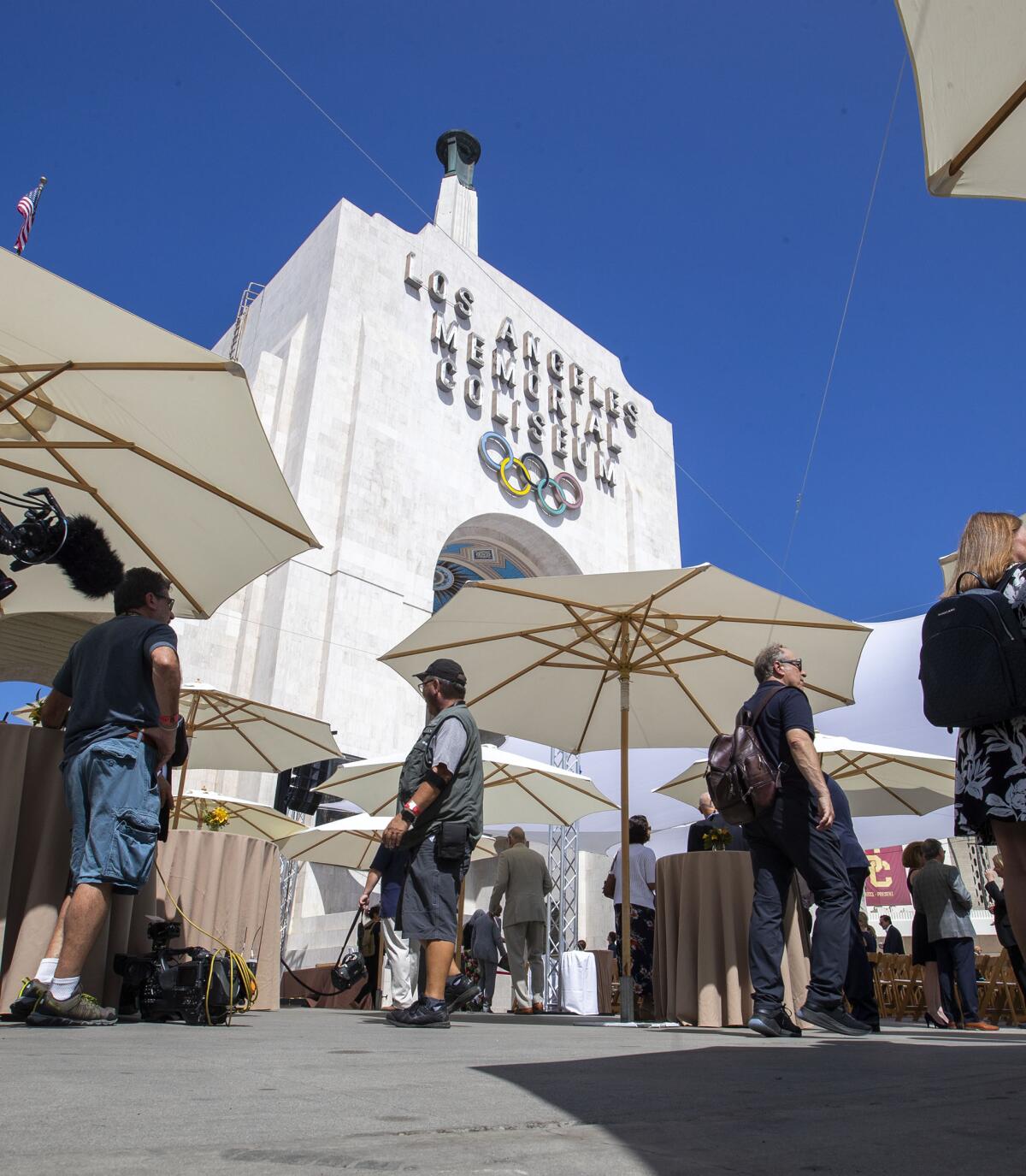
Los Angeles officials have reached a tentative agreement with private organizers of the 2028 Summer Olympics that, while short on details, serves as a road map for the biggest issues facing the city as it inches toward hosting a sporting event that could cost $7 billion or more.
Much of the so-called Games Agreement focuses on financial risk and the need for insurance against the type of expenses Tokyo incurred when the coronavirus outbreak forced a one-year postponement of its Summer Games.
The proposed contract also identifies concerns involving traffic and the homeless population, as well as the need to include small businesses and local workers in discussions about hiring and procurement.
“The Olympics and Paralympics are a golden opportunity to make sure that we can advance solutions to the issues of our day,” Councilman Mitch O’Farrell said in a statement before viewing the contract. “We have seven years to get there.”
The 25-page document was released Wednesday, allowing time for public scrutiny before a City Council vote expected later this year. Instead of providing dollar amounts or explicit policies, officials and the LA28 organizing committee would establish deadlines for finalizing their plans over the next few years.
The report is expected to be heard in the Ad Hoc Committee on the 2028 Olympics and Paralympic Games, which is chaired by O’Farrell, unless council members waive it out of committee.
As preparations continue for the 2028 Los Angeles Olympics, here are a few of the most pressing issues for L.A. residents and the answers we have.
A hospitality workers union criticized the current lack of specifics regarding workplace standards and hiring of Black workers, among other things. Unite Here Local 11 said in a statement: “The Olympics tourism infrastructure boom can transform the lives of L.A.’s working families, but the Games Agreement, as drafted, fails to take into account some of the most urgent issues our city is facing today.”
Organizers insisted it was premature to issue a finalized contract.
“It can’t be an agreement that locks in every detail because the one thing we need is flexibility,” said Casey Wasserman, a sports and media executive who led the bid campaign and now serves as LA28 chairman. “Seven years is a long time and the world can change a lot.”
The seemingly backward nature of this process — a city committing to host before knowing the particulars — is common in the Olympics movement and helps explain why past Games have amassed huge deficits.
Los Angeles could be different, given its history of holding successful Olympics in 1932 and 1984. Unlike other hosts that spent billions on construction, the LA28 committee will make use of existing facilities such as Staples Center (soon to be known as Crypto.com Arena), SoFi Stadium, the Coliseum and Pauley Pavilion.
“Every other city is an apple and we’re an orange,” Mayor Eric Garcetti said. “We have our venues built.”
Though the estimated budget has risen from $5.3 billion during the bidding process to $6.9 billion when adjusted for inflation, organizers vowed to cover all expenses by way of contributions from the International Olympic Committee and revenue from domestic sponsorships, ticket sales and other sources.
Making good on that promise will be crucial because city and state legislators agreed to serve as a financial backstop, pledging taxpayer dollars to pay for any cost overruns.
“If all we do is deliver a great competition for 17 days, we will have missed our opportunity to do something really special for the community.”
— Casey Wasserman, LA28 chairman
The city also will have to provide “enhanced resources,” boosting police, fire, sanitation, traffic and parking control services during the 17 days of competition. Negotiations over this issue will boil down to a simple question: What does the city believe is necessary and what does LA28 consider reasonable to pay for?
The contract calls for settling on a list of services and an agreed-upon price by October 2025.
“I’m certain there will be things we don’t agree on,” Wasserman said. “I’m also certain we share a vision and a perspective that will allow us to work through any of those issues.”
The proposed agreement between the city of Los Angeles and the LA28 organizing committee.
L.A.’s path to the Games has been unusual because of a 2017 arrangement in which the city agreed to drop its bid for 2024 in return for getting 2028. That meant 11 years to prepare instead of the customary seven.
Organizers also negotiated an important concession from the IOC, gaining more leeway to pursue domestic sponsorships. They have worked over the last four years, entering a potentially lucrative partnership with NBCUniversal and signing deals with the likes of Delta Air Lines, Nike and Deloitte.
On Wednesday, the IOC praised LA28 for its “astute commercial success. Having signed a multitude of high-level domestic sponsors and licensing agreements to date, the organizing committee has a solid financial base to deliver the Games.”
But union officials aren’t the only ones pushing back.
The NOlympics LA coalition has criticized City Hall for devoting time and resources to a sporting event amid more pressing troubles. The activist group also worries about poor and homeless people being swept out of the way.
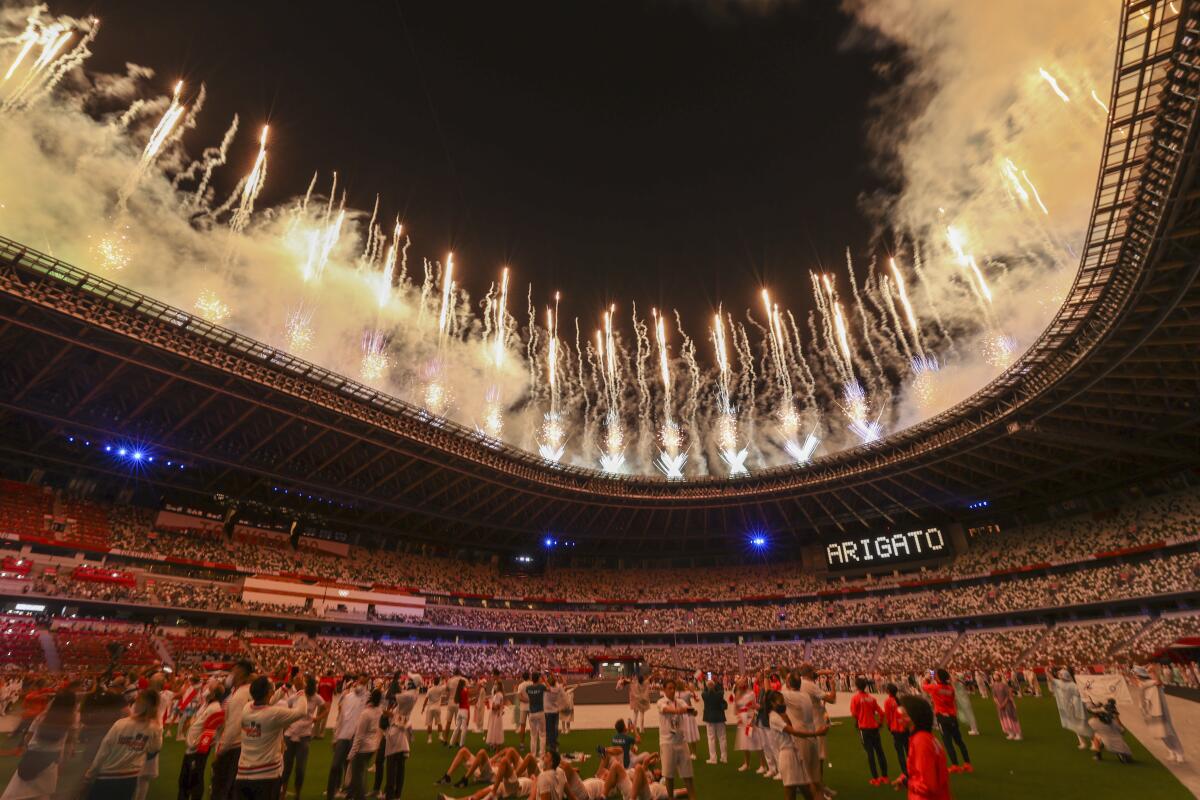
“It’s remarkable how little LA28 has evolved in the last few years and how unprepared they are to meet the moment, particularly when it comes to engaging with the public and addressing the very real concerns that our coalition has been raising for years,” organizer Anne Orchier said recently.
Garcetti insisted that “those concerns have been shared and those criticisms have been heard.” The contract includes a provision vowing to work with community advocates and establish a policy that would “compassionately and responsibly protect the rights of local unhoused communities.”
Wasserman acknowledged the Olympics could bring security sweeps to clear perimeters around venues.
The hospitality workers union noted that the agreement makes no reference to housing or protections against displacement, saying “it is essential for any governing document of this massive event to prioritize the well-being of low-income Angelenos.”
In response to other concerns, the proposed contract promises to address environmental sustainability and create programs for local hiring and for helping small businesses procure Olympics-related contracts. There are also provisions for making “affordable” tickets available to underserved communities, though the mechanism for this provision remains unclear.
“If all we do is deliver a great competition for 17 days,” Wasserman said, “we will have missed our opportunity to do something really special for the community.”
World Baseball Softball Confederation president Riccardo Fraccari is confident an upgraded form of baseball featuring international stars will be played during the L.A. Games.
As for the threat of clogged freeways, a “mobility and transport plan” would address congestion on roads and at Los Angeles International Airport, making use of existing projects that include the current LAX redo and public transit improvements funded by a 2016 ballot measure. Unlike some previous host cities, Garcetti said, “we built the Olympics around our infrastructure plan, not vice versa.”
Organizers are hoping for a repeat of the 1984 Games, for which traffic surprisingly improved because many residents left town, businesses shifted to flexible work hours and truck deliveries were scheduled at night.
Still, taxpayers figure to worry most about the bottom line. The 1976 Montreal Olympics left a reported $1.5-billion debt and the 2004 Athens Games turned into a boondoggle that many believe contributed to Greece’s financial downfall.
The Games Agreement reaffirms parts of a plan by which LA28 would set aside approximately $700 million in a contingency fund to pay for cost overruns. Organizers also would have to list all Games-related contracts in excess of $1 million.
The Tokyo Olympics debacle has exposed an IOC that disrespects the will of locals, brushes off concerns of experts, and prioritizes its profits.
The insurance provision would require coverage against “natural disasters, communicable diseases, terrorism, civil unrest, cyberattacks, event cancellation and coverage for reduced ticket sales and other revenue sources should the events become less appealing.”
This type of insurance has become more expensive during the COVID-19 pandemic, so LA28 plans to wait for rates to stabilize over the next few years. Wasserman cites this as another reason to keep the proposed contract a bit vague for now, saying: “It’s not intended to answer every question seven years before we deliver the Olympic Games.”
More to Read
Go beyond the scoreboard
Get the latest on L.A.'s teams in the daily Sports Report newsletter.
You may occasionally receive promotional content from the Los Angeles Times.
